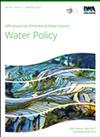巴西的水和环境卫生服务:基于制度分析和发展框架的监管治理评估
IF 1.8
4区 环境科学与生态学
Q4 WATER RESOURCES
引用次数: 0
摘要
巴西的水和卫生服务框架(WSS)是复杂的,有几个参与者来自不同的法律性质和不同的规则。新的巴西卫生法旨在实现普遍获得卫生服务和有效提供服务,通过促进竞争力鼓励提高效率。然而,该行业的监管治理对实现这些目标构成了挑战。本文将根据制度分析和发展(IAD)框架确定和分析WSS结构,该框架提供了一个多维概念图,结合了宏观和微观情况的层次。交叉引用了国家卫生信息系统(SNIS)和巴西地理与统计研究所(IBGE)的数据库,以评估提供WSS的结构,重点是位于巴西大都市地区和城市群的市政当局。可以得出结论,内部法框架有助于澄清行动者、其职能、责任和它们之间的相互作用,以及外生因素及其如何影响行动领域,并在德尔菲方法的支持下提出建议,例如在治理和监管治理方面改进行业监管。本文章由计算机程序翻译,如有差异,请以英文原文为准。
Water and sanitation services in Brazil: evaluating the regulatory governance based on the institutional analysis and development framework
Brazilian's framework of water and sanitation services (WSS) is complex, with several actors from different legal natures and varied rules. The new Brazilian sanitation law aims to achieve universal access to WSS and effective provision of services, encouraging more efficiency by promoting competitiveness. However, the regulatory governance of the sector poses a challenge to achieve these objectives. This article addresses identifying and analyzing the WSS structures based on the Institutional Analysis and Development (IAD) Framework, which provides a multidimensional conceptual map that combines levels of macro and micro situations. Databases from the National Sanitation Information System (SNIS) and the Brazilian Institute of Geography and Statistics (IBGE) were cross-referenced to evaluate the structures that exist in the provision of WSS, focusing on municipalities located in the metropolitan regions and urban agglomerations of Brazil. It is possible to conclude that the IAD Framework helps to clarify the actors, its functions, responsibilities, and the interactions between them, as well as the exogenous factors and how they influence the action arena, reaching recommendations, supported by a Delphi approach, such as to improve industry regulation in terms of governance and regulatory governance.
求助全文
通过发布文献求助,成功后即可免费获取论文全文。
去求助
来源期刊

Water Policy
环境科学-水资源
CiteScore
3.10
自引率
12.50%
发文量
81
审稿时长
6-12 weeks
期刊介绍:
Water Policy will publish reviews, research papers and progress reports in, among others, the following areas: financial, diplomatic, organizational, legal, administrative and research; organized by country, region or river basin. Water Policy also publishes reviews of books and grey literature.
 求助内容:
求助内容: 应助结果提醒方式:
应助结果提醒方式:


